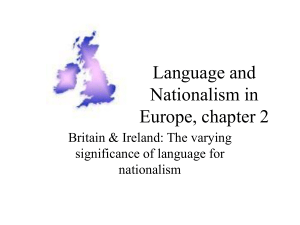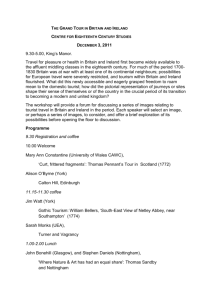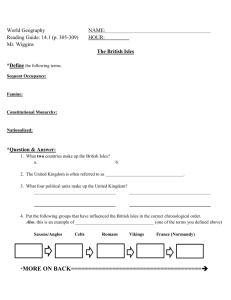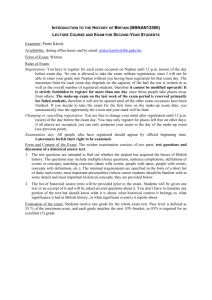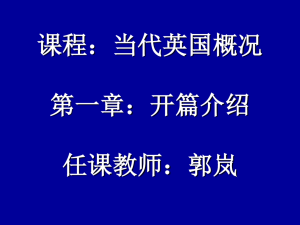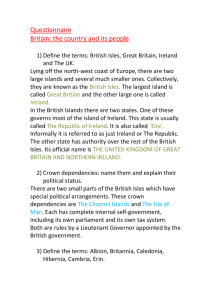Chapter 15: The British Isles and Nordic Nations
advertisement
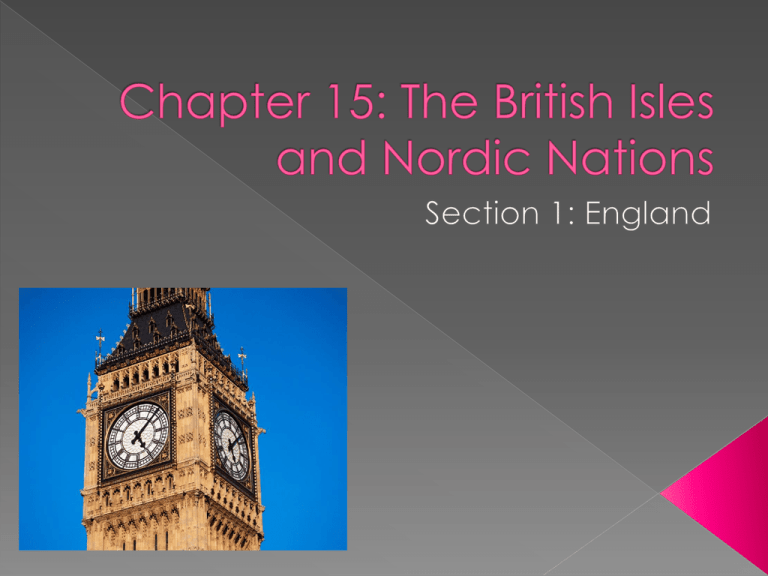
Locate England on the map on page 289 The largest island in the British Isles- and in all of Europe- is Great Britain. The island of Great Britain is made up of three independent countries: England, Scotland and Wales Together, with Northern Island , makes up Great Britain. Made up of three different areas: › Highlands › Midlands › Lowlands A short distance to the south east are the Midlands. Here lie the thick veins of coal that fueled the country’s Industrial Revolution. Highest populations of England are in the Midlands. To the south and east are the lowlands Lowlands tend to be fertile--- what does this mean? The lowlands provide England with some of its most productive farms. Farmers grow: wheat, vegetables, and other similar crops. Also, this area is great for sheep, dairy and beef cattle. Europe always had a surplus of goods. This lead to cities being developed along rivers and coast. London became the most popular city--Why??? London is located on the Thames River. The location always ships to sail right up to the ports of London. The port of London grew rapidly in the 1500s because of changes in the patterns of world settlement and trade. London became what is it today due to the location. In the 1500s, Britain shipped a lot of its products across the world fueling the Industrial Revolution. Became known as “the workshop of the world” Earliest technological advances were used in to produce textiles or cloth. Also had a lot of iron ore which made some cities triple in size. Also was the leading producer of coal. This helped England but at what cost? In the late 1800s, Britain’s power was challenged by two new forces: Germany and the USA. Now, Britain turned to its oil supply under the North Sea as a source of fuel. Tertiary Economic Activities: service industry Examples: finance, insurance, and tourism. Europe is growing and its economy is doing very well. 2. Describe the three different physical areas of the English landscape. 3. What geographic factors affected London’s level of development? 4. A. What impact did technological innovations have on the British economy? B. What impact did they have on Britain’s physical landscape? 5. A. What was the effect of the Industrial Revolution on Britain’s coal supply? B. How has the British economy recovered from the loss? Scotland occupies nearly one third of the land area in the United Kingdom, but only has less than 10% of the population Landscape is rugged The highland region is a large, high plateau with many lakes, called lochs, which were carved by retreating glaciers Moors?— Bogs?-- This area has the best climate for fishing and sheep herding. South of the highlands runs a long lowland region. 75% of people live in this region. However, due to economic hardships this area had a lot of people leave. Closest to the English border Primarily sheepraising region Produces a lot of wool New industry are slowly taking the place of mining, steel making, and shipbuilding. Today, Scotland drills for oil in the North Sea Glen---??? Maintains its own culture –Give me examples on how they did this? It is very different from England. Has its own › -capital -postage stamps -flag -language Wales is a peninsula of Great Britain About the size of Massachusetts Has a marine west coast climate Usually receives more rain than England Some Welsh have sat on English Parliament however they are seeking cultural independence. The key to preserve Welsh culture is language 2.9 Million people speak English 20% still speak Welsh Very similar to the economic history of England and Scotland Capital city: Cardiff In the early 1900s, Wales fell really behind in technology -In the 1980s, people lost their jobs and quit school In the 1990s, it began to improve slightly 2. What are the major physical characteristics of Scotland? 3.A.In what ways has Scotland preserved its cultural heritage? B. How have the Welsh maintained their cultural identity? 4. What role has technology played in the economic changes that have occurred in Wales between the late 1800s and today? 5. Analyze the survival of the Welsh language in modern Welsh society. What does it say about Welsh society’s view of cultural change? Hills ring most of the coastline The middle of the Island is a plain that drains into River Shannon -Has a marine west coast climate that keeps the island very green. 1/6 of the island is covered in peat (a spongy material containing waterlogged mosses and plants) Celtic tribes from Europe first settled Ireland around 300 b.c. Repeatedly defended off the Vikings In 1066, Norman invaders invaded England and tried to take over the Irish › Banned marriages between Normans and Irish › Banned Celtic language (Gaelic) › Outlawed Celtic music Up to the 1500s, Roman Catholics ruled most of Europe until the Reformation. Where Protestant religion was introduced. Most of the Irish remain Catholic while most of the English switch to Protestant. The division led to bitter conflicts between Irish Catholics and landlords sent from England. The Protestant minority controlled most of the wealth while the Irish Catholics were very poor. Led to Cultural Divergence: deliberate efforts to keep the cultures separated. The Potato Famine hit Ireland in the 1840s. A blight, or plant disease, destroyed the potato crops year after year. Rebellions between 1916-1921 led officials in the United Kingdom and Ireland to divide the island into 2 parts. The 6 northeastern counties remained part of Great Britain, the rest were independent. Became officially independent in 1949, but did not end conflict. A little over half of Northern Ireland’s people are Protestant, the rest are Catholic. Both sides remain quite violent in trying to get control over Northern Ireland. In the 1990s, The Irish government tried to improve several parts of their society including: › Education › Telecommunication Was very successful! -Per capita increased -unemployment fell to 3.8% -increased immigration In 1990, Ireland adopted the Euro. 2. Why is Ireland called the Emerald Island? 3. Describe the geographic processes that led to the formation of two political units in Ireland. 4. How has the government of Ireland tried to improve the economy? 5.a. Determine whether or not the following is a fact or opinion: “Protestants and Catholics in Northern Ireland both feel threatened by the past and are reluctant to negotiate.” B. Do you agree or disagree with this statement? Explain. It is identified because its “North” A collection of peninsulas an islands separated by seas, gulfs, and oceans. Varies drastically among nations Much of the landscape on the Scandinavian Peninsula is the product of the last ice age. 1000s of lakes are located in this region. Soil is very rocky and hard to farm. When the glaciers melted, water filled the valleys, creating flooded glacial valleys known as fjords (FEE YAWRDZ) Some of the fjords are so deep boats can sail on them in order to go to the ocean. In Iceland, volcanoes and glaciers exist side by side. Allows them to produce geothermal energy: or energy produced from the heat of the earth’s interior. At midwinter, the sun may shine only 2 or 3 hours a day. In midsummer, it shines more than 20 hours a day. Can see the northern lights from this area of the world Climate is surprisingly mild Mild marine west coast climate due to the warm currents of the North Atlantic Drift Coldest area is east of a mountain chain that runs northeast to southwest Norway. The Vikings were originally from this area of the world. The five countries were briefly united under Queen Margrethe of Denmark in 1397. The union ended in 1523 when Sweden withdrew. Most Nordic people belong to the Lutheran Church. All have a language with similar roots and all understand English. All five nations are democracy All have mixed economies---what are mixed economies? Some of the countries such as Denmark and Sweden have staterun day-care centers and state-supported medicare Usually neutral in foreign affairs. Have sound economies Denmark and Southern Sweden have flat land and a mild climate Denmark uses 60% of its land for farming Norwegians use fishing techniques. This region also benefits from oil and gas .

